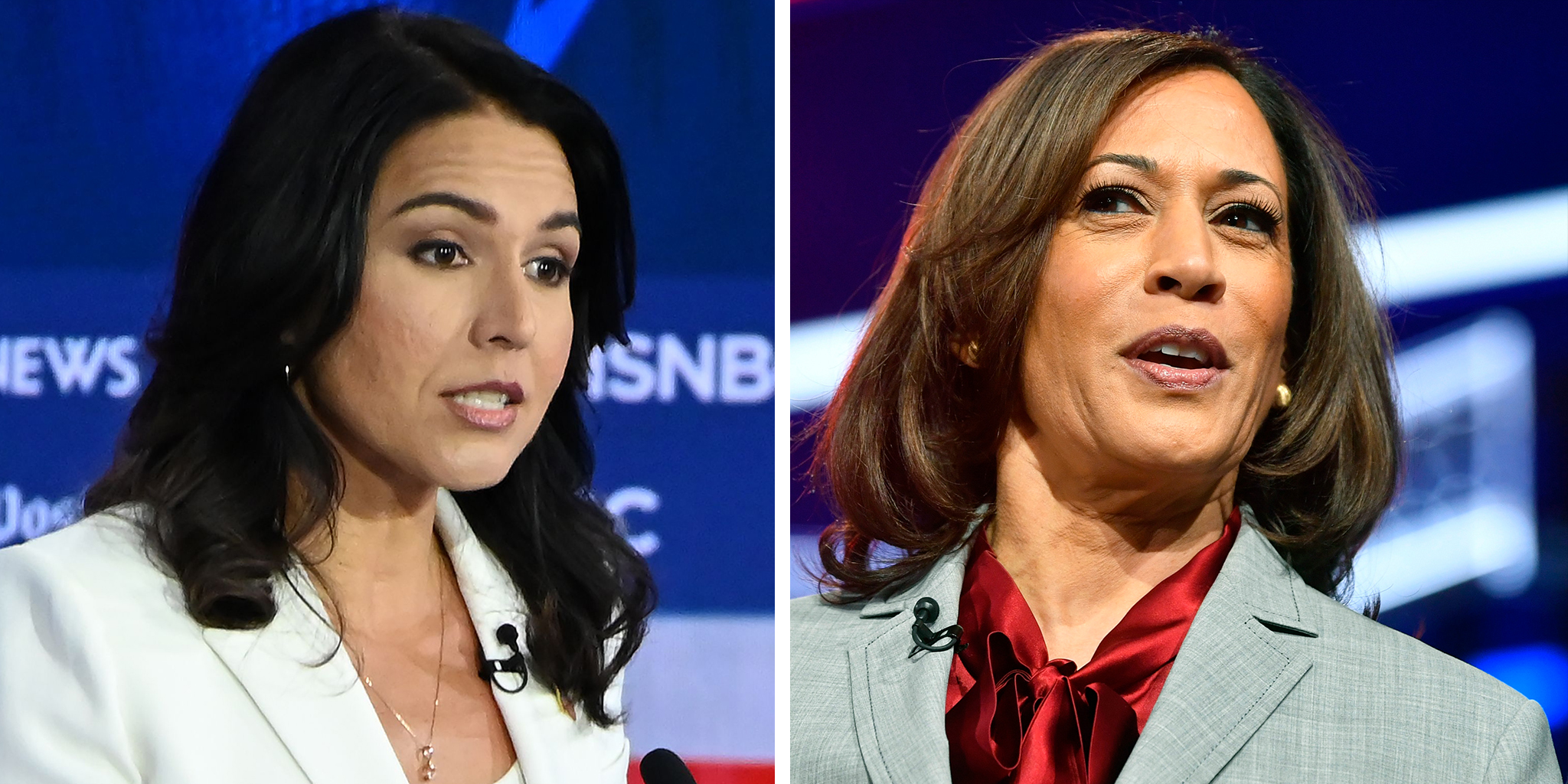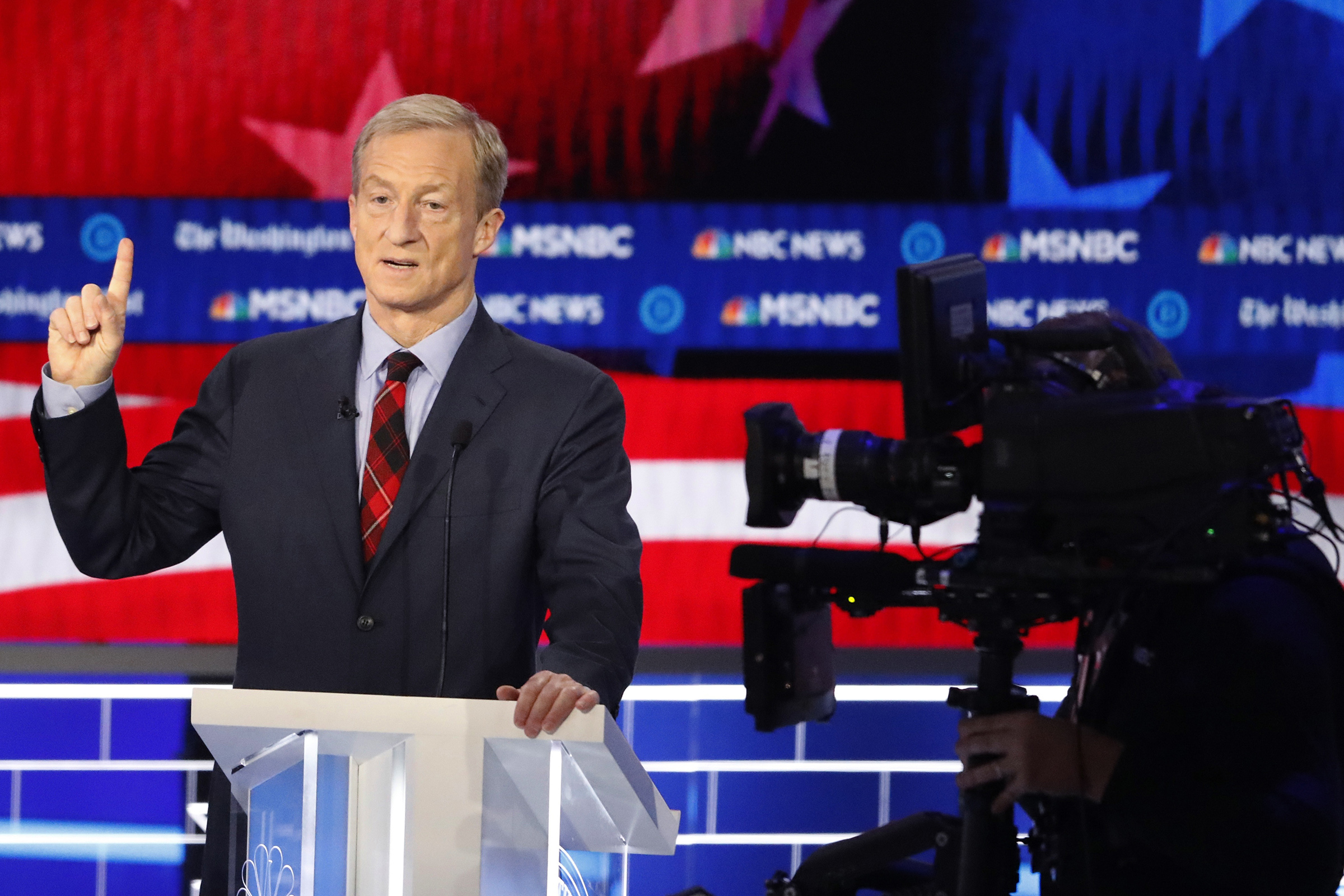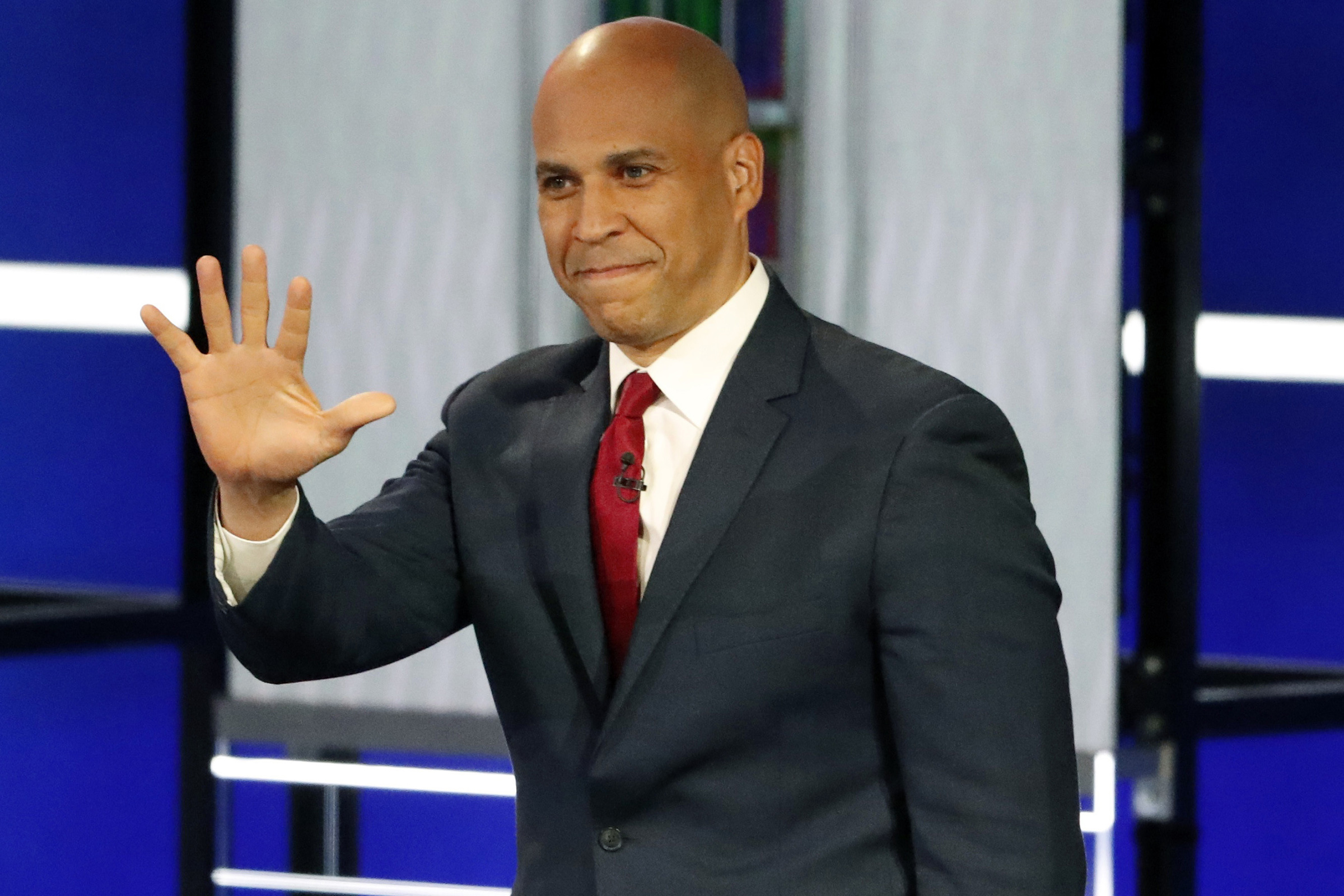New Jersey Sen. Cory Booker came out swinging at Wednesday night’s Democratic debate, landing some hits on his rivals even as he has struggled to get ahead in the polls. He ended the debate with a plea for support, reminding viewers that he has yet to qualify for the December debate.
After a dramatic day in Washington, featuring E.U. Ambassador Gordon Sondland’s testimony before the House impeachment hearings, most of the November MSNBC/Washington Post debate in Atlanta was low-key. The debate touched on some of the major issues of the election cycle, but it didn’t probe deeply into too many of those topics. Red-meat Democratic issues like income inequality, the trade war with China, and criminal justice were raised, but the usually front-and-center topic of healthcare was mostly absent from the discussion, despite the fact that Massachusetts Sen. Elizabeth Warren released—and faced scrutiny for—her plan to pay for Medicare for All since the last debate. There was also no question about LGBTQ issues, despite Wednesday being Transgender Day of Remembrance.
The impeachment inquiry into President Donald Trump was the first question asked by the all-female panel of moderators. Every candidate on stage supports the inquiry, although many urged their party to not let the campaign stray too far from policy issues. “If we let [Donald Trump] consume us we’re going to lose the election,” Vermont Sen. Bernie Sanders warned. Less-discussed issues like affordable housing, abortion rights and paid parental leave also had more air time than in the past. Climate change also received more focus, after being barely raised in October.
Booker criticized Warren on her wealth tax plan and mocked former Vice President Joe Biden for not wanting to legalize marijuana, saying that he thought Biden “might have been high” for his policy stance. He jumped in when other candidates spoke about courting black voters: “I have a lifetime of experience with black voters. I’ve been one since I was 18.”
Booker wasn’t the only candidate who came prepared to criticize his opponents. Hawaii Rep. Tulsi Gabbard and South Bend Ind., Mayor Pete Buttigieg sparred once again over foreign policy, and California Sen. Kamala Harris and Minnesota Sen. Amy Klobuchar debated paid family leave. Buttigieg faced notably little fire from fellow candidates. After leading in polls in Iowa and New Hampshire, many predicted he would be the candidate to beat Wednesday. But despite some attacks from Klobuchar and Gabbard for being inexperienced, he largely came away unscathed.
Here’s everything that happened in the November Democratic debate.
Booker to Biden: ‘I thought you might have been high when you said it’
The audience burst into laughter when Booker took a swipe at Biden’s stance on marijuana. “This week, I heard him literally say that ‘I don’t think we should legalize marijuana.’ I thought you might have been high when you said it,” Booker said. Booker has advocated for completely legalizing marijuana, arguing during the debate that the drug is “already legal for privileged people,” while people of color are disproportionately the target of law enforcement.
Biden has instead advocated for “decriminalizing” marijuana, which would include permitting states to legalize recreational pot and expunging marijuana-related convictions.
Earlier in the week, Biden said more research was needed on marijuana to determine whether it was a “gateway drug.”
Biden’s #MeToo response raises eyebrows
When Joe Biden was asked about the #MeToo movement and what he would do to address gender-based violence, the former Vice President stressed his part in passing the Violence Against Women Act. But then Biden went on to talk about advocating for women with a turn of phrase that some found cringe-worthy given the subject matter.
“No man has a right to raise a hand to a woman in anger other than in self-defense and that rarely ever occurs,” he said. “And so we have to just change the culture, period, and just keep punching at it and punching at it and punching at it.”
When his comments drew confused laughter from the audience, he continued: “It will be a big — No, I really mean it. It’s a gigantic issue. And we have to make it clear from the top, from the President on down, that we will not tolerate it.”
Biden has drawn criticism for his own interactions with women over the years, including for touching women in ways that some said made them uncomfortable or were without their consent. And while he has apologized and said he would be more careful, he has continued to joke about the issue on the campaign trail.
Buttigieg and Gabbard spar over foreign policy again
The two military veterans on the stage — Gabbard and Buttigieg — reprised their foreign policy squabble in Wednesday’s debate. Gabbard accused Buttigieg of inexperience for purportedly saying he wanted to send troops to Mexico to fight the cartels — a claim he immediately called out as being wildly inaccurate.
“I know it’s par for the course in Washington to take remarks out of context, but that is outlandish even by the standards of today’s politics,” Buttigieg responded. “Are you saying that you didn’t say that?” Gabbard said.
“I was talking about U.S.-Mexico cooperation. We’ve been doing security cooperation with Mexico for years, with law enforcement cooperation and a military relationship that could continue to be developed,” Buttigieg said. “Do you seriously think anybody on this stage is proposing invading Mexico?” he continued. “That’s not what I said,” she responded as the crowd laughed. Gabbard also argued that Buttigieg did say he would send troops to Mexico, and the fact-checkers can “check this out.”
This was not the first time the two have clashed over foreign policy. In the October debate, Gabbard accused Buttigieg of wanting to further American imperialism because he didn’t support a full withdrawal of troops from Syria. Gabbard has repeatedly argued that the U.S. “regime change war” in the region had furthered the bloodshed. Buttigieg shot back at the time that U.S. withdrawal from the region is what actually led to more carnage.
On Wednesday night, Buttigieg also turned the attack back on Gabbard, highlighting the fact that she met with Syrian leader Bashar al-Assad during a 2017 trip to the country. Buttigieg said he has enough judgement that he “would not have sat down with a murderous dictator like that.”
Gabbard responded that his answer shows he “would lack the courage to meet with both adversaries and friends.” She then listed American presidents who sat down with adversaries: JFK and Khrushchev; Roosevelt and Stalin; Reagan and Gorbachev.“
Like Donald Trump who met with Kim,” Buttigieg cut in. Gabbard ignored him.
Harris and Gabbard clash again
Harris and Gabbard revived their fireworks from the July debate when they clashed after they were onstage for about 30 minutes together. Harris kicked things off when she questioned the Hawaii Congresswoman’s loyalty to the Democratic party, and cited her association with Syria after Gabbard said that as President she would work to end “regime change wars.”

“I think that it’s unfortunate that we have someone on this stage who is attempting to be the Democratic nominee for President of the United States who during the Obama Administration spent four years full-time on Fox News criticizing President Obama,” Harris said. “That’s ridiculous, Senator Harris,” Gabbard retorted.
But Harris continued, adding that in addition to being a guest on Fox News, Gabbard “buddied up to Steve Bannon” before Trump’s inauguration and “fails to call a war criminal by what he is,” referencing the controversy surrounding Gabbard’s 2017 visit with Syrian President Bashar al-Assad.
In her rebuttal, Gabbard said that Harris was “continuing to traffic in lies and smears and innuendos because she cannot challenge the substance of the argument that I’m making.” Harris, who has recently dropped in national polls, was initially on the receiving end of an attack from Gabbard during the second night of the July debate when Gabbard went after Harris for her record as prosecutor in California. “I am deeply concerned about this record. There are too many examples to cite,” Gabbard said at the time, adding that she should apologize to those who “suffered under your reign as a prosecutor.”
Harris responded that she was “proud” of her work as a prosecutor. “I had to reform a system that was badly in need of reform.”
Candidates address climate change
Climate change also returned to the fore on Wednesday, after being notably absent in the October debate.
Tom Steyer pledged that he would declare climate change a national emergency if elected, and decried Congress for failing to pass a single piece of climate change legislation.“ If climate change isn’t priority one it won’t get done,” he said, adding that “I’m the only person on this stage who will say that climate is the number one priority for me.” Steyer founded the advocacy non-profit NextGen Climate Action, and spent millions of his own dollars to fight climate change.
Steyer and Biden briefly sparred over the issue, each attacking the other for not doing enough to fight climate change. Biden also called climate change “the existential threat to humanity, it’s the number one issue.” Sanders, meanwhile, quibbled with the question itself, noting that “You asked what we are going to do in decades. Well, we don’t have decades.”

Impeachment quickly took center stage
While many of the previous Democratic debates kicked off with a robust health care policy discussion, the moderators this time chose to go straight to news of the impeachment inquiry that dominated Washington, D.C. earlier Wednesday.
The initial question came after a day of high-profile testimony in public hearings in the House’s impeachment proceedings. Gordon Sondland, the U.S. Ambassador to the European Union and key witness in the inquiry, testified that he and other U.S. officials worked at the “direction of the President” when they cooperated with President Trump’s personal lawyer Rudy Giuliani in urging Ukraine to open investigations into the 2016 election and the Ukrainian energy company in which Joe Biden’s son sat on the board as conditions for a meeting with the White House.
The question was initially posed to Warren, who reflected on Sondland’s testimony and noted that his ambassadorship emphasized the problem with money in politics, since he was appointed by Trump after making a $1 million donation to his inaugural committee. Warren has said she is ready to vote to convict the President in a Senate trial, and was one of the first candidates to call for the President’s impeachment after the Mueller report was released in the spring.
Klobuchar addressed the question after Warren. While she has said she wants to wait for a trial in the Senate before deciding to convict the President, she added that she felt the United States’ democracy was at stake in the impeachment inquiry. Sanders argued that while impeachment is important, Democrats should not let the issue consume the election. “If we are consumed [by Donald Trump] we are going to lose the election,” he said. Sanders pointed to other important issues for voters, including healthcare, income inequality and the affordable housing crisis. Buttigieg echoed Sanders’ point to focus on the issues, adding that the candidates are running to be President themselves after Trump leaves office.
Kamala Harris used her record as a prosecutor to explain why she believes allegations against the President spread throughout his administration, and was blunt when she stated “We have a criminal living in the White House.”
Biden, who is at the center of the impeachment investigation, said he would get Republicans to work with him and would get done “what is needed to be done” to secure a Democratic majority in the Senate.
Booker attacks Warren’s wealth tax
In one of the first big exchanges of the night, Booker mounted a direct attack on one of Warren’s signature plans—a wealth tax. Booker described the tax as “cumbersome” and said that it has been eliminated by many of the other countries that have implemented it.
“We as Democrats have got to start talking not just about how we tax from a stage, but how we grow wealth in this country amongst those disadvantaged communities that are not seeing it,” Booker said, adding that he wants there to be an “equality of opportunity.” He instead advocated for increasing the estate tax and the capital gains tax, which treats investment gains as taxable income.
Booker added: “We as Democrats need to fight for a just taxation system, but … we Democrats also have to talk about how to grow wealth, as well.”
Warren defended her plan by saying, “A wealth tax is not about punishing anyone. It’s about saying, ‘You built something great in this country? Good for you. All of us helped pay for it.’”
The wealth tax is a crucial part of Warren’s plans because she aims to use the windfall to fund other parts of her platform, such as universal childcare and canceling student loan debt. Warren has said a wealth tax would also combat what her campaign calls an “extreme concentration of wealth” in the United States.
Warren proposes a 2% tax on households with net wealth (which includes assets like property, certain kinds of businesses and works of art) above a threshold of $50 million. Warren has argued that taxing wealth would generate more than $3 trillion over 10 years.
Economists disagree about whether a wealth tax would work. Critics note that other countries have gotten rid of their wealth tax because it’s so difficult to execute, in part because it’s hard to put a price tag on assets. Others argue that the wealthy would be able to protect their assets, while the tax would harm smaller businesses, and therefore the middle class.
Advocates for Warren’s plan argue that tax evasion by carefully enforcing the law, and that a high threshold for the tax, would protect businesses controlled by the middle class.

Yang lands a laugh
The tech entrepreneur has often forged his own path during the debates (see: his lack of tie), and on Wednesday managed to bring a moment of levity to the stage while answering a serious question about Russian interference in U.S. elections — coyly referencing Special Counsel Robert Mueller’s investigation into President Trump and Russia.
Asked what he’d say on his first call to Russian President Vladimir Putin upon winning the presidential election, Yang said, “Well, first I’d say, ‘I’m sorry I beat your guy,’” he responded as laugher broke out in the audience. He then gave a more serious response, saying that he’d tell the leader “the days of meddling in American elections are over.”
More Must-Reads from TIME
- Caitlin Clark Is TIME's 2024 Athlete of the Year
- Where Trump 2.0 Will Differ From 1.0
- Is Intermittent Fasting Good or Bad for You?
- The 100 Must-Read Books of 2024
- Column: If Optimism Feels Ridiculous Now, Try Hope
- The Future of Climate Action Is Trade Policy
- FX’s Say Nothing Is the Must-Watch Political Thriller of 2024
- Merle Bombardieri Is Helping People Make the Baby Decision
Write to Madeleine Carlisle at madeleine.carlisle@time.com, Rachel E. Greenspan at rachel.greenspan@time.com and Abigail Abrams at abigail.abrams@time.com
